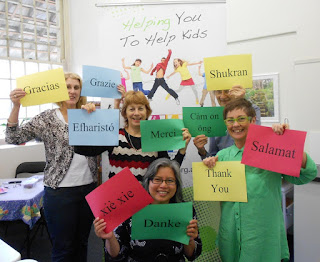As
AWCH celebrates its 40th anniversary during 2013, it is timely to
reflect on all the AWCH volunteers past and present who have contributed to the
improvements made in the care of children in Australian hospitals over the last
40 years.
From
the very first meeting in 1973 when a bunch of concerned men and women got
together to form an association, AWCH volunteers have
worked hard to make things so much better for children and their families.
‘In the newspapers and magazines of the 1960s/70s, information about children in hospital centred around hospital success stories; visits of royalty and film stars; Easter bunnies delivering a surfeit of Easter eggs; and Father Christmas and his helpers with an abundance of toys and good cheer. The stories conveyed images of hospitals working near miracles; of everyone caring about children in hospital and of the kindness shown by hospitals for their child patients.
All of this was true but it hid a very dark underside
to the hospitalisation of children - long term, often devastating, emotional
trauma.
In Australia, the need for change was heralded by the
concern expressed in 1970 by the Aust. & N.Z. College of Psychiatrists.
Their Position Statement entitled “The admission of mothers to hospital with
their young children" accused hospitals of……doing more damage in one year
than all the psychiatrists together could undo in several years. . .
That hospitalisation could have such devastating
effects on young children was well known to me. In the late 1960's I worked for
three years in the children's unit of a psychiatric hospital handling the most
severely emotionally disturbed children in the State. Hospitalisation at an
early age appeared regularly in the case histories of these children.
One would have expected the psychiatrists' position
statement to bring forth cries for an immediate enquiry and remedial action.
Instead, it was virtually ignored. The hospitals' case was that parents upset
children who were soon settled and better off without them. A fallacy already
forcefully disproved by the published works, both written and audiovisual, of
James and Joyce Robertson http://www.awch.org.au/2-year-old-goes-to-hospital.php
 |
|
The "cage” cot with a wire frame 1976
|
In the 1970's, I saw one of these in a regional
hospital in NSW, another one in Victoria. In each case, the hospitals saw the
cage as a perfectly valid solution that ensured the child's safety, even though
there were empty beds at the side of the cot which could have been used by a
parent. Indeed, in Victoria I was told the cage was used because the child was
the only one in the ward so, instead of having a nurse there just for one
patient, the sister in the adult ward kept popping in. When I asked why they
hadn't admitted the child's mother in these circumstances, I was told it wasn't
hospital policy. The nurse admitted she would willingly have let the mother
stay (had it been allowed) as the toddler was a nuisance disturbing and
upsetting her patients all night.

Cracking the system
In the literature, the problems of hospitalisation of
children had been identified and the solutions outlined. As hospitals failed to
implement more humane policies, there were various attempts by individuals and
groups to force action but none had been successful. Hospital boards were
thought to be omnipotent. To challenge them from inside the hospital was to
invite personal disaster career-wise; to challenge from the outside was to
invite ridicule as a trouble-maker.
At the first meeting of the group which subsequently
became AWCH I voiced my strongly held convictions:
- that infants and young children needed their
mothers in hospital and that need had to be met
- that parents and professionals must work together
publicly if the above aim was to be achieved
Thus AWCH was born in the belief that parents and
professionals together could crack the system' for the good of the
children.’
During this national volunteers week 2013 AWCH would
like to thank all our volunteers both past and present



